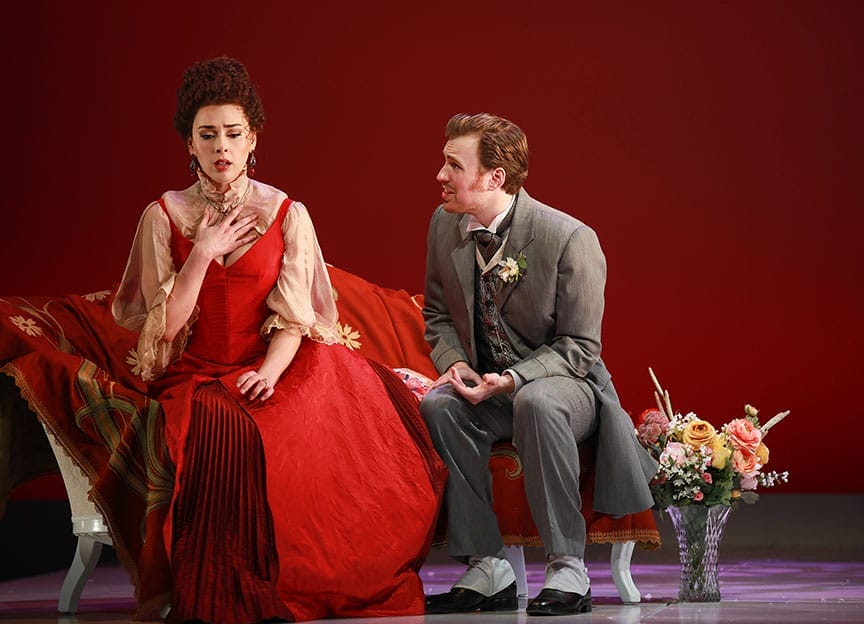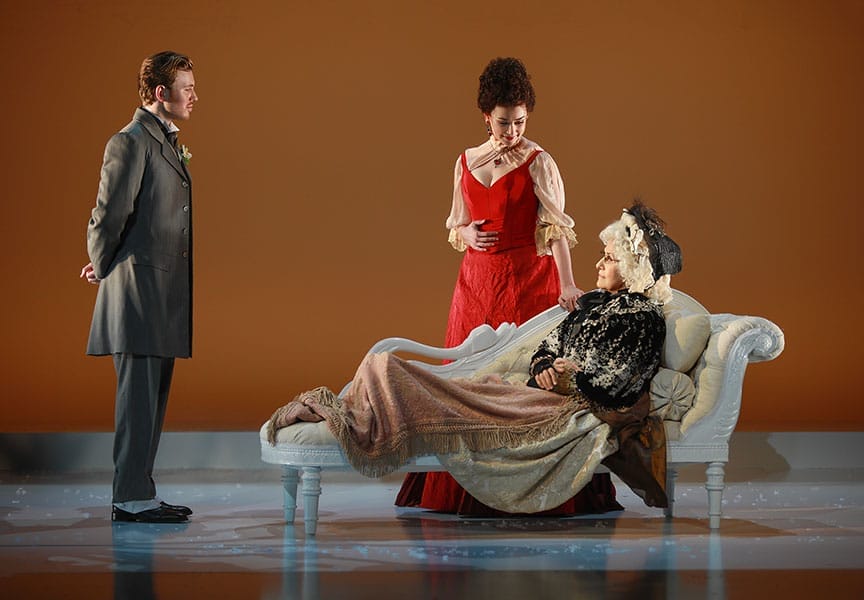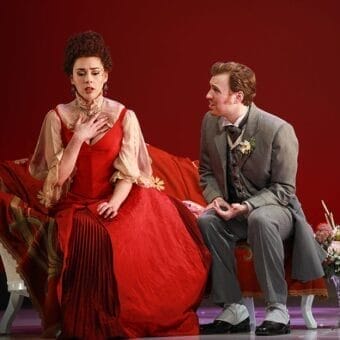by Kristen Nevarez Schweizer
February 23, 2024

Audiences at The Old Globe’s Age of Innocence experience the characters’ ache of almost, but not quite. In this Globe-commissioned world premiere adaptation of Edith Wharton’s classic novel, lionhearted Ellen (compellingly played by Shereen Ahmed) defies 1870s societal standards by escaping a brute husband overseas. Returning to her high-society New York family, she is barely accepted in her separation, and fear of scandal looms in the possibility of a contested divorce. Ellen’s ingenue cousin May (played sweet and simpering yet surprisingly sly by Delphi Borich) is engaged to vanilla Newland Archer (Callum Adams), who initially tolerates the impropriety on the behalf of his beloved but soon finds himself drawn to the spirited Ellen.
Wharton penned Age of Innocence to reconcile “childhood memories of a long-vanished America” with post-Great War societal change. While this novel earned Wharton the distinction of being the first woman to win the Pulitzer Prize, it’s noteworthy the year’s award was meant to go to Sinclair Lewis. Due to the perceived unwholesomeness of his book, the judges chose Wharton. (When Lewis won in 1926, he retaliated by being the first author to reject it.) Context fractures a straightforward cry of victory. Similarly, playwright Karen Zacarías warns audiences, “Do not underestimate anybody in that love triangle.”
The production’s stark, deconstructed set design by Arnulfo Maldonado and minimal sound design by Darron L. West signal from the outset that this rendition will diverge from the passionate Martin Scorsese’s 1993 film nor ferry audiences through a rote affair in the opulent wealth of the Gilded Age. Sharp silhouettes on the cyclorama backdrop may symbolize the shadow of unlived life, while an empowering Beyoncé hit during the curtain call hints Ellen evaded both a disastrous marriage and a lesser lover.

The beauty of a classic American story re-written by a Latina playwright and directed by Gen X-er Chay Yew is the fresh eyes in interpretation and modern nuance. No character—not even the elderly relative portrayed by Socorro Santiago—is wholly vilified or elevated, leaving audiences divided on who to root for or who found a “happy” ending.
In terms of performance, Shereen Ahmed shines in every scene. The addition of Eva Kaminksy as a guidepost narrator thankfully showcases more of Wharton’s biting wit, which is missing from the dialogue. It’s always a pleasure to see local standout Mike Sears, who brings humor as a gossipy gentleman. Michael Underhill, brought up from summer stage and understudy roles, proves his charismatic presence.
Special mention to Susan E. Mickey’s sculpted, textured gowns which displayed appropriate propriety, needed sensuality, and tangible evidence of the sumptuous wealth of Industrialism. Her expert eye and use of color weaves a compelling narrative alongside lighting designer Lee Fiskness.
Compliments to director Yew for closing on a gorgeous and cathartic tableau, leaving audiences with a sense of completion akin to finishing a long novel.
The Age of Innocence
By Edith Wharton | Adapted by Karen Zacarías
Directed by Chay Yew
The Old Globe Theatre
February 8 – March 10, 2024







